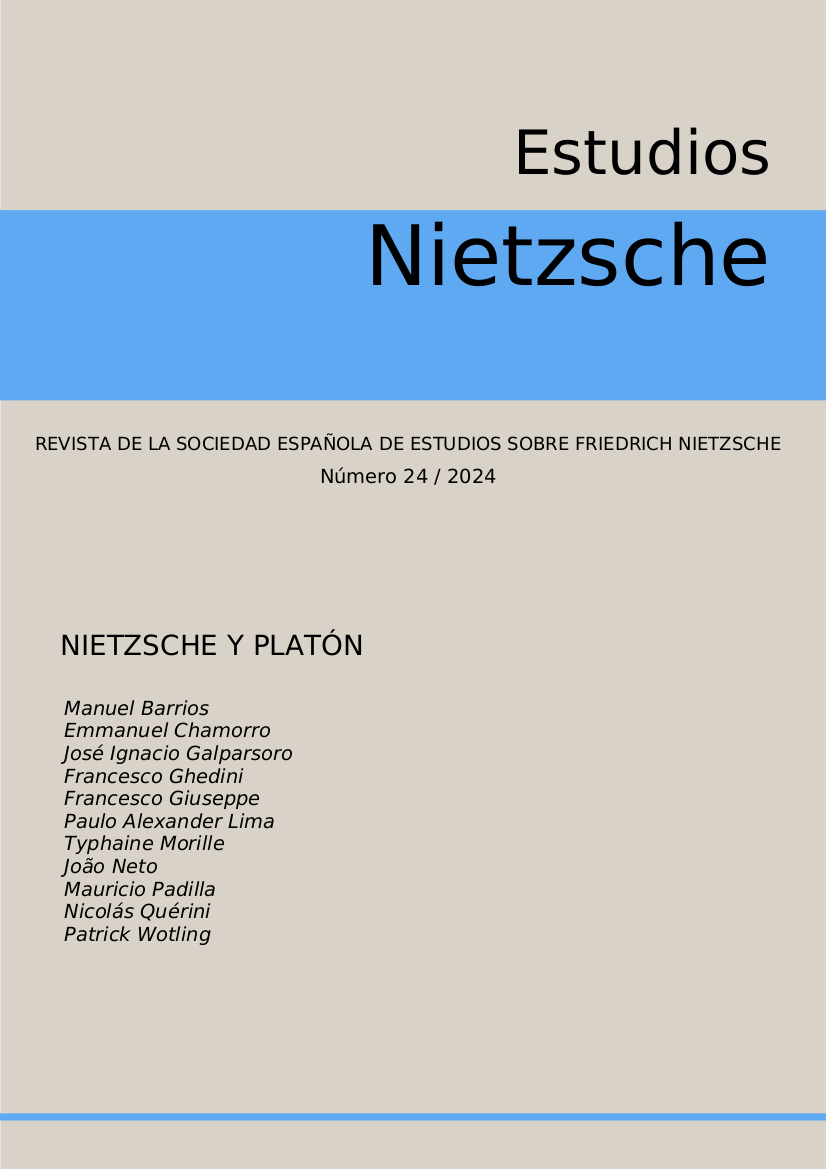Beats of prey, tamed beasts
Beasts of prey, Tamed beasts. Plato's "Gorgias" in the light of Friedrich Nietzsche's "On the Genealogy of Morality"
DOI:
https://doi.org/10.24310/en.24.2024.18014Keywords:
re-evaluation of values, justice, genealogy of morals, valuesAbstract
Much has been written about the complicated relationship between Friedrich Nietzsche and Plato. However, beyond the irreconcilable nature of their positions and interests, both carry out their philosophical enterprise by confronting the dominant values of their time in order to question them and propose, in turn, an alternative way of living and feeling. Just as Nietzsche detects a first re-evaluation of all values (Umwertung aller Werte) in the rebellion of the slaves in morality, Plato would do the same with the Socratic theses of the Gorgias. Nietzsche himself points to a re-evaluation of all values, just as Plato and Judeo-Christianity had done before him.
Downloads
Metrics
References
ACAMPORA, CHRISTA DAVIS, (ed.), Nietzsche’s On the Geneaology of Morals. Critical Essays, Maryland: Rowman & Littlefield Publishers, 2006.
DELEUZE, GILLES, Nietzsche y la filosofía, trad. de Carmen Artal, Barcelona: Editorial Anagrama, 2016 [1971].
GARCÍA-BARÓ, MIGUEL, Gorgias, Salamanca: Ediciones Sígueme, 2010.
JAEGER, WERNER, Paideia: los ideales de la cultura griega, trad. de Joaquín Xirau y Wenceslao Roces, México: Fondo de Cultura Económica, 2016 [1957].
NIETZSCHE, FRIEDRICH, Más allá del bien y del mal. Preludio de una filosofía del futuro, trad. de Andrés Sánchez Pascual, Madrid: Alianza Editorial, 2013 [1972].
NIETZSCHE, FRIEDRICH, Crepúsculo de los ídolos. O Cómo se filosofa con el martillo, trad. de Andrés Sánchez Pascual, Madrid: Alianza Editorial, 2017 [1973].
NIETZSCHE, FRIEDRICH, La genealogía de la moral. Un escrito polémico, trad. de Andrés Sánchez Pascual, Madrid: Alianza Editorial, 2014 [1972].
NIETZSCHE, FRIEDRICH, Ecce Homo. Cómo se llega a ser lo que se es, trad. de Andrés Sánchez Pascual, Madrid: Alianza Editorial, 2011 [1971].
NIETZSCHE, FRIEDRICH, Fragmentos póstumos, 4 vol. Madrid: Tecnos, 2006-2010.
NIETZSCHE, FRIEDRICH, Obras completas, 4 vol. Madrid: Tecnos, 2011-2016.
PLATÓN, Diálogos I, trad. de Julio Calonge Ruiz, Madrid: Gredos, 2010.
Downloads
Published
How to Cite
Issue
Section
License
Copyright (c) 2024 Mauricio Padilla

This work is licensed under a Creative Commons Attribution-NonCommercial-ShareAlike 4.0 International License.
As of issue 21 (2021) this journal is published only in open access (diamond route).
From that number 21, like the previous numbers published in NIETZSCHE STUDIES, they are subject to the Creative Commons Acknowledgment-NoComercia-ShareIgual 4.0 license, the full text of which can be consulted at <http://creativecommons.org/licenses/by-nc-sa/4.0 >
It is the responsibility of the authors to obtain the necessary permissions of the images that are subject to copyright.
This work is licensed under a Creative Commons Attribution-NonCommercial-ShareAlike 4.0 International License.
Copyright generates two different rights: moral rights and patrimonial rights that EJFB recognizes and respects. Moral rights are those relating to the recognition of the authorship. They are rights of a personal nature that are perpetual, inalienable, unseizable and imprescriptible as consequence of the indivisible union of the author and his/her work.
Patrimonial rights are those that can be derived from the reproduction, distribution, adaptation or communication of the work, among others.







11.png)
